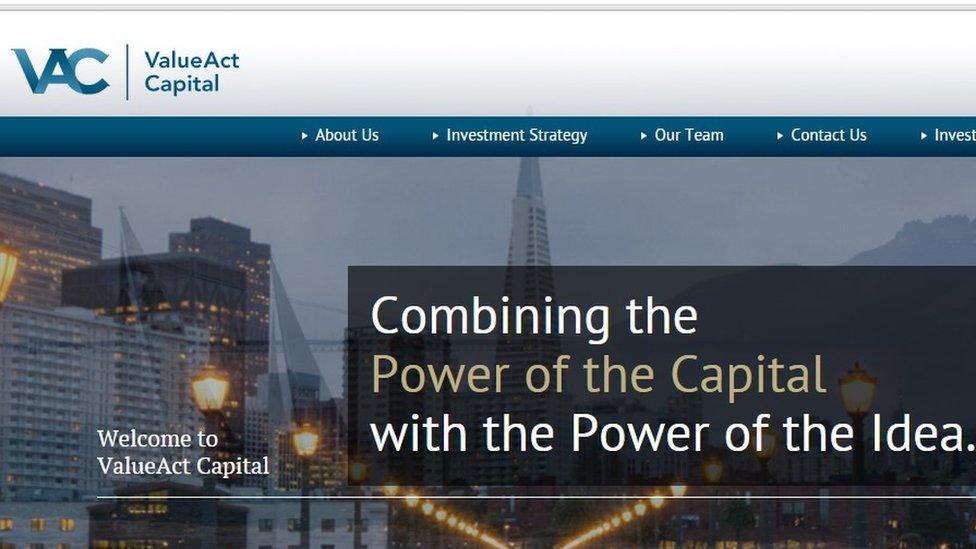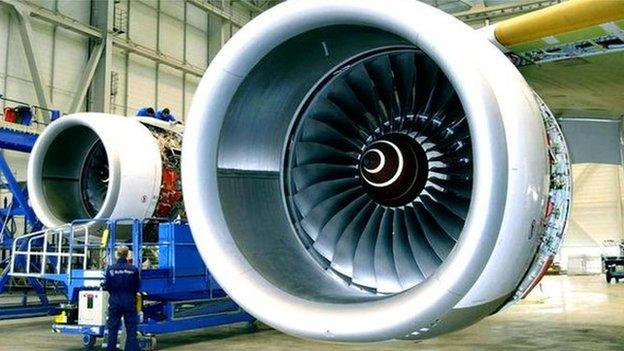Who are US activist investors ValueAct Capital?
- Published

UK engineering firm Rolls-Royce has faced a number of problems over the past two years, having found itself making five profit warnings as its stock price has taken a hammering.
Now it faces a new challenge, as US based activist hedge fund ValueAct Capital, which owns just over 10% stake in the firm, has been pressing for a seat on Rolls-Royce's board.
While ValueAct describes itself as driving "value-creating strategies", management at Rolls-Royce has previously called the investor an "opportunist".
ValueAct, which is now Rolls-Royce's biggest shareholder, is also reported to want the British firm to focus on its main aero-engine business, which accounts for about half of profits, and to offload its unit which makes marine engines.
The marine business makes engines and nuclear reactors for ships, submarines and the offshore oil and gas industry, while the aero business makes engines for passenger jets built by Boeing and Airbus.
'Undervalued' companies'
Based in San Francisco, ValueAct was founded in 2000 by Jeffrey Ubben, its chief executive and chief investment officer, "to manage the capital of its founders, along with the capital of a limited number of outside investors".
Mr Ubben is an ex-mutual fund manager at Fidelity and has served as a director at more than 20 companies, including Sara Lee.
ValueAct says it manages more than $19bn (£12.6bn) on behalf of some of the world's most respected institutional and individual investors.
The fund usually makes about three to four new investments a year, and has a reported $3.3bn (£2.2bn) stake in Microsoft.
It says it "concentrates on acquiring significant ownership stakes in companies it believes are fundamentally undervalued".
ValueAct explains that "such companies may be temporarily mispriced for a variety of reasons, including perceived unfavourable industry conditions, poor business performance, changes in management or ownership, reorganizations, or other external factors.
"These conditions can often result in fundamentally "good" businesses that are available at depressed valuations."
Which is no doubt how ValueAct would say it sees Rolls-Royce.
Last week ValueAct nearly doubled its holding to 10.01%, making it by far the largest investor in Rolls-Royce, and giving more impetus to its request to take a seat on the board and cut costs.
'Farm team'
On its website, the San Francisco-based fund says it "works constructively with management and the company's board to implement value-creating strategies".
Some major Rolls investors are reported to be supportive of ValueAct, believing its presence could provide insight that it is lacking at present.
As well as profit warnings seeing its share price fall by close to 40% in 2015, Rolls-Royce still has Serious Fraud Office investigations into bribery allegations in China, Indonesia and other parts of the world, hovering over it.
Despite this the firm is obviously of interest to ValueAct, which at any given time has a portfolio of ten to 18 core company investments, as well as a small "farm team" of additional investments in development.
But running such a diverse operation is not without potential pitfalls.
On Monday, ValueAct said its fund had fallen by 8.3% during the third quarter, erasing its gains for the year. It had been hit by a drop in shares of a main portfolio company, Valeant Pharmaceuticals International.
- Published24 November 2015
